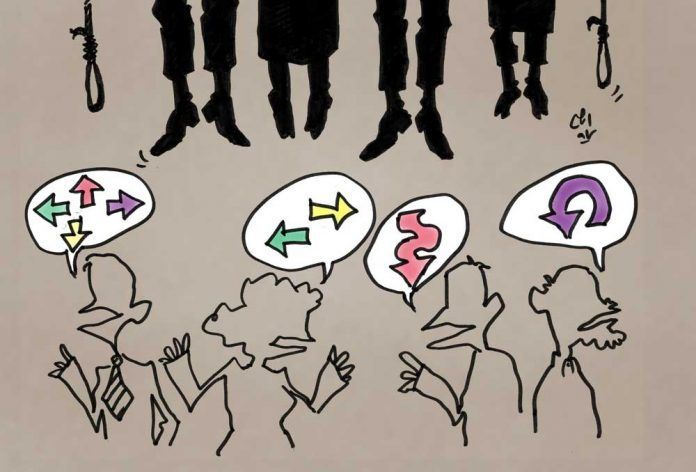By Ahmad Rafat
The nationwide unrest which started in Mashhad, capital of the northeastern province of Khorasan, on December 28, and quickly spread to other parts of the country, breathed new life into various opposition organizations, groups, political parties and leaders of the resistance movement.
There have been many strike actions by teachers, truckers, pensioners and merchants since January, protesting the government’s failure to tackle the country’s severe economic problems, including the high cost of living, double-digit inflation, unemployment, and the volatile foreign exchange market. Even staunch supporters of the Islamic Republic have been somewhat critical of the regime, including young conservatives who wish to play a more significant role in running the country, and moderates who have called for “reforming the reforms.”
Many new opposition groups and organizations have emerged in recent months, including “National Unity for a New Iran (Aban)” founded by Houshang Amirahmadi, an Iranian-American academic and political analyst. Mr. Amirahmadi, a faculty member at Rutgers University’s Edward J. Bloustein School of Planning and Public Policy, was a candidate in the 2005, 2013 and 2017 Iranian presidential elections. Amirahmadi has, on some occasions, promoted greater participation of the Islamic Revolutionary Guards Corps (IRGC) in the polls. However, his new political stance may have stemmed from the recent nationwide popular protest against the regime.
Iran Revival, also known as Farshgard, is a political action network founded in September 2018 by 40 Iranian activists, most of whom were born on or around 1979. It advocates a secular democracy, either through a Republic or a Constitutional monarchy. The network has managed to attract a large number of supporters in a relatively short time. It is inspired by the pro-democracy movements in Eastern Europe which led to the fall of the Soviet Union. The group’s slogan “We Will Reclaim Iran and Rebuild It” and its call for a “million-person march” has made it a credible force in mobilizing the Iranian public.
We have also witnessed the rebirth of the “Iranian Left Party” last year which is made up of the remnants of the Organization of Iranian People’s Fedai Guerrillas (OIPFG), better known as Fadaiyan-e-Khalq, an underground Iranian Marxist-Leninist group.
Various opposition groups seem to be willing to find ways to put their differences aside and work towards a single goal of establishing a secular democratic government in Iran.
The “Iran Freedom and Prosperity Party (ARA)” is a Western-style social democrat party which emerged in Frankfurt, Germany last year. One of its founders, Siavash Abghari, told Kayhan Life that ARA advocates a secular democratic government.
The newly formed “Center of Coordination for Iranian Opposition Kurds,” which came out of the Komala Party of Iranian Kurdistan’s sixth congress, has joined other emerging political entities which are calling for a fundamental political change in Iran. It is an umbrella organization consisting of five Kurdish groups.
In February, 15 prominent Iranian social, political and cultural figures called on the United Nations to question the legitimacy of the Islamic Republic. Although the measure didn’t gain much support, some of the signatories to the letter, proposed a plan to manage the post-Islamic Republic transitional period. The idea for the ”Transition Management” was first proposed at the “Unity for Democracy in Iran” conference in London. The advocates of a secular democracy, a Republic and constitutional monarchy exchanged ideas at the meeting.
Many opposition groups believe that Iran’s exiled Prince Reza Pahlavi can play a significant political role in bringing about change in the country, particularly since many of the protesters in January were shouting slogans in support of him and a constitutional monarchy. Not every group supports Mr. Pahlavi. He has, however, expressed his unconditional support for any movement that calls for the overthrow of the Islamic Republic.
The primary goal of the opposition groups seems to be to topple the Islamic Republic, a fact that has gravely concerned the leaders of the regime particularly given the recent unrest and ongoing protests and strike actions. There are, however, some factions within the opposition movement which have been sitting on the fence. Their position on many issues is somewhat ambiguous. It would appear on the one hand that they promote reforms but not regime change, and on the other hand, that they wholeheartedly support those who are trying to topple the Islamic Republic. They are opportunists who hedge their bets. It serves them well to remember that in January the protesters chanted: “Reformists, conservatives, your time is up. The end is near.”
Translated from Persian by Fardine Hamidi


